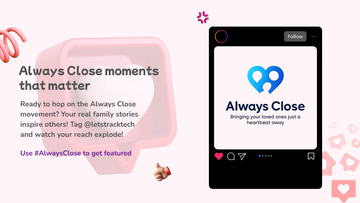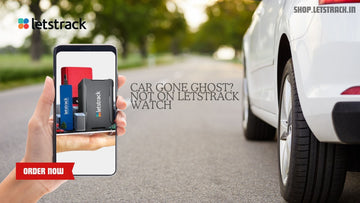Smart trackers are available in a wide range of shapes and sizes, each offering unique features to meet the needs of even the most detail-oriented users. With so many choices out there, how can you determine which one is right for you? Here’s a brief comparison to assist you in making your decision.
Key Differences at a Glance
Here’s a quick comparison chart to help you decide which tracker is best for you.
| Feature | Bluetooth Trackers | GPS Trackers |
|---|---|---|
| Price | ₹499 - ₹3000 (mostly no monthly fees) | ₹1899+ (subscription required) |
| Connection Range | 200 - 300 feet | Unlimited (real-time tracking) |
| Battery Life | 1.5 - 2 years (replaceable) | 3 - 7 days (rechargeable) |
| Sound Alerts | Yes, built-in | Typically not included |
| Geofencing | Limited to Bluetooth range | Multiple geofencing zones |
| Community Help | Available (other user’s help) | Not available |
| Size | Small (keychain or card-sized) | Bulkier, heavier |
| Best Use Case | Everyday items (keys, wallet) | Expensive or important items, large areas |
What Are Smart Trackers?
Smart trackers are compact devices that you can attach to items like keys, wallets, or even pets. They connect to an app on your phone, allowing you to find lost belongings by showing their location or making the device ring. These trackers communicate with your mobile device either directly or through an external service.
There are two main categories of trackers: Bluetooth trackers and GPS trackers.
What is a Bluetooth Tracker?
A Bluetooth tracker is a device that uses Bluetooth technology, which became popular around 2012 with the launch of Bluetooth Low Energy (BLE). This technology enables efficient and low-power communication. Typically, these trackers work by maintaining a Bluetooth connection between the tracker and your smartphone. Thanks to the energy efficiency of BLE, these trackers are compact, easy to carry, and can last a long time on a single replaceable coin battery, often up to 1.5 to 2 years.
What is a GPS Tracker?
GPS tracking has been available for many years, gaining broader accessibility in the 1990s when the U.S. military made its satellite network available to the public. GPS trackers utilize satellite signals to deliver real-time location updates. Although they are very accurate, they typically involve an additional expense, such as a monthly subscription for the service.
Detailed Comparison
Price:
-
Bluetooth Trackers: Usually range from $10 to $50, Bluetooth trackers typically don’t come with monthly fees, although some brands might charge for additional features.
-
GPS Trackers: These tend to be more expensive, starting at around $50. Moreover, they often require a monthly subscription for tracking services.
Connection Range:
-
Bluetooth Trackers: Typically, their range is confined to 200-300 feet, depending on the Bluetooth connection between the tracker and your smartphone.
-
GPS Trackers: In contrast, GPS trackers provide a much broader range and deliver real-time location updates by utilizing satellite signals. Their connection is nearly limitless, making them perfect for tracking over long distances.
Battery Life:
-
Bluetooth Trackers: These devices usually come with replaceable coin batteries that can last anywhere from 1.5 to 2 years. While some models are rechargeable, they generally have a battery life measured in months rather than years.
-
GPS Trackers: In contrast, GPS trackers tend to use more power, typically lasting about 3 to 7 days on a single charge with their rechargeable batteries. As a result, these devices often require more frequent recharging.
Sound Alerts:
-
Bluetooth Trackers: A key feature of Bluetooth trackers is the option to make the tracker emit a sound when you're trying to find it. Additionally, you can use the tracker to make your phone ring if you've lost it.
-
GPS Trackers: In contrast, GPS trackers typically don't have sound alerts, and if they do, this feature often comes with extra charges.
Geofencing:
-
Bluetooth Trackers: These devices can only track items that are within Bluetooth range. You'll receive a notification when you move in or out of this range, but the connection can be spotty and may occasionally provide inaccurate proximity readings.
-
GPS Trackers: GPS devices enable you to create geofences for various locations, alerting you when the tracker enters or exits a specified area. This feature makes them perfect for keeping an eye on larger spaces.
Community Help:
-
Bluetooth Trackers: Several Bluetooth trackers come with a community search feature, allowing you to enlist the help of other users nearby to locate your lost item.
-
GPS Trackers: In contrast, GPS trackers lack community support because they provide a constant connection to your phone or an external service.
Size:
-
Bluetooth Trackers: Usually compact and lightweight, Bluetooth trackers are made for portability, often resembling the size of a keychain or credit card. This design allows them to be easily attached to everyday items without creating extra bulk.
-
GPS Trackers: Because of their advanced technology, GPS trackers are generally larger and heavier. Although some of the smallest versions are roughly the size of a modern car key, they aren't as convenient for carrying in your pocket compared to Bluetooth trackers.
Battery Recharging:
-
Bluetooth Trackers: Although many Bluetooth trackers come with replaceable batteries, some of the latest models are equipped with rechargeable batteries. These batteries usually last for several months, though the lifespan can vary based on how often the tracker is used.
-
GPS Trackers: Most GPS trackers are designed with rechargeable batteries, but they typically require more frequent recharging—often every few days—depending on the specific model and how it's used.
Which Tracker Should You Choose?
Bluetooth Trackers are ideal for everyday use, especially if you often misplace items like keys, wallets, or your phone. They work best in familiar environments such as your home, office, or car. The accompanying app will display the last known location, and you can activate a sound on your tracker to help locate it nearby.
On the other hand, GPS Trackers are better suited for tracking high-value or important items, particularly in larger, unfamiliar areas. If you're traveling or have left an expensive item somewhere and it’s gone missing, GPS trackers offer real-time location data, typically accurate to within a few meters. However, keep in mind the additional costs associated with both the device and the subscription service.
Ultimately, the choice is yours: Bluetooth trackers are budget-friendly, user-friendly, and perfect for keeping tabs on everyday items. On the other hand, GPS trackers tend to be more expensive but provide accurate real-time tracking, making them suitable for larger or more valuable possessions. If you're looking for a dependable, locally-made option, Letstrack stands out as a brand known for its quality, safety, and customer service.



